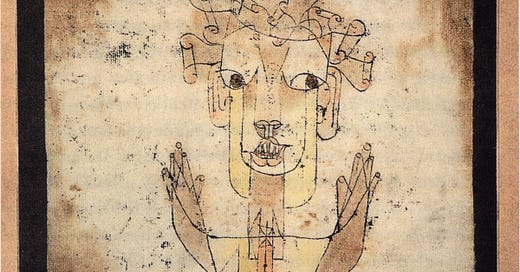Leonard Cohen
Baby, I've been waiting
I've been waiting night and day
I didn't see the time
Yeah, I waited half my life away
There were lots of invitations
And I know you sent me some
But I was waiting
For the miracle, for the miracle to come
— Leonard Cohen, “Waiting for the Miracle”, 1992
The lyrics to the first verse are simple, even a bit banal. Across six more verses and atop a moody electronic backing track with the allure of a brewing storm, a slow-burn menace builds. This is the later Cohen, not the dark-eyed romantic of dreamy sixties folk pop, like “Suzanne”, this is the haunted Cohen, the fedora’d busker playing a Casio keyboard at the end of time Cohen, the pack-a-day oracle Cohen. Nobody uses these weird cheapo synth presets like this Cohen does. They only add to the ontological seediness.
It is strange, in this song, to feel the miracle so much in its absence. The entire world of the song unfolds in a space of the miracle not happening. It is a murky world, uncertain, devoid of right and wrong. One feels that an eternity could pass before the miracle comes—if it ever does. The song feels suspended, endless, full of dread, the most tense song about something not happening.
I first heard “Waiting for the Miracle” in the opening credits to Oliver Stone’s 1994 film, Natural Born Killers. This is a fallen world, the song says here. I’m not sure I could stomach a rewatch of Stone’s self-aware spectacular violence. The soundtrack, supervised by Trent Reznor, remains impeccable.
Babies
My wife and I are expecting our first child. His due date, as of this writing, is in about a week and a half. We’ve been waiting for a miracle ourselves. So far, thankfully, with far less dread than Leonard Cohen. The strange temporality of anticipation, though, remains. Is the miracle coming today? Maybe. Is it coming in three weeks? Maybe then. How do you dwell in the moment, when the miracle could come, at any second?
Religions that turn babies in messiahs are on to something. Jesus walks onto the Christian stage as an infant being born—and encapsulates a recognition that every baby is a little messiah, a little miracle, to its family. Every human goes through birth, it is the most commonplace thing you can think of, yet every individual time, it is the most fantastic of events for everyone in its orbit. For the miracle, we wait.
The Revolution
“Every second of time is the strait gate through which the Messiah might enter.” - Walter Benjamin, Theses on the Philosophy of History, 1940
We wait for our child to arrive. Although that’s just a figure of speech. He has always been with us, inside his mother’s womb. He could not be closer. When he arrives, he will have arrived by separating, by already being further from his mother than he was to begin with.
These days I think of Benjamin’s pronouncement these often. He makes it in one of the last pieces he ever wrote, the oft-cited and controversial Theses, written just before he fled Vichy France for Spain to escape Nazi capture, only, following a series of misfortunes, to die by his own hand.
The pronouncement of the strait gate, I think, is offered by Benjamin as a hopeful antidote to the famous image of the “angel of history” that he locates in Paul Klee’s print, Angelus Novus. The melancholic angel is forever trying to reassemble the ruins of history that surround him, only to be blown constantly forward by a storm, which “we call progress.”
We may find ourselves surrounded by history in ruins, our collective dreams shattered, but the job still remains, to treat each moment as a possibility for futurity, an opening for a miracle to creep in. Waiting for the miracle can be endless dread, or unbounded hope.
Paul Klee, Angelus Novus, 1920



